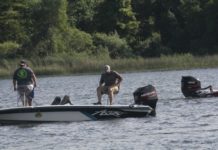Catching up with one of my closest fly fishing buddies over the weekend, the conversation invariably turned to music. It always does with a certain type of guy from our generation.
As we sat in his man cave, enjoying the warmth from a wood-burning stove, the song “Hypnotized” streamed from the cave’s shelf speaker. It was time to play music trivia, and I believe we drew a tie.
Gloriously, it led to a detailed conversation focused on “middle-period” Fleetwood Mac. Bracketed between the Chicago Blues-drenched Peter Green era and the shimmering pop confections of the Lindsey Buckingham/Stevie Nicks commercial behemoth, the band of the early 1970s was a reliable vehicle for delivering melodic rock and beautiful ballads.
Admittedly, some of it can’t match the sustained quality of what came before and after, but still the first half of the 1970s featured band recordings that reward the effort of seeking out and giving a listen. Since this is a short work week and our conversation renewed my interest, I’m tracking this intriguing phase of the group’s progression.
The first album of the middle era was 1970s’ “Kiln House,” which was a follow-up to “Then Play On,” the swan song of the band under Green’s leadership. After such a tour de force, one might expect its successor to disappoint, but, instead, it rocks, it rolls, and seldom fails to delight.
The evolution of the band from strictly Chicago-blues influences continues from “Then Play On,” although “Kiln House” combines flashes of blues brilliance aligned with more melodic contributions from the remaining two guitarists, Jeremy Spencer and Danny Kirwan. Standout tracks include “Jewel Eyed Judy” and “Tell Me All the Things You Do.” Once this album gets its hooks in you, you’ll wear out the grooves in short time.
After the departure of Spencer, it took the band more than a year to follow-up with “Future Games,” the band’s first album featuring both a non-Brit and a female as fully acknowledged members; respectively, guitarist Bob Welch and keyboardist Christine McVie.
The rhythm section of Mick Fleetwood and John McVie is stellar, as usual, and the prog-folk overtones prompt comparisons to Steeleye Span. Unfortunately, this terrific album (best listened to on headphones) got lost in the shuffle of all the other great music released the same year.
The dual guitars of Kirwan and Welch bowed out after 1972’s “Bare Trees.” As a finale, it’s an amazing sendoff for Kirwan (Welch would stick around for another couple of years). Kirwan contributed the lion’s share of the album’s songwriting – five songs, and not a clunker in the bunch, which includes the stellar title track and the instrumental “Sunny Side of Heaven.”
The album is an embarrassment of riches. Both songs written by Welch are magnificent, “The Ghost” and “Sentimental Lady” (a vastly superior version to the solo remake Welch released several years later on his debut solo album). Likewise, Christine McVie’s “Homeward Bound” and “Spare Me a Little Bit of Your Love” are notable.
After the band jettisoned Kirwan, Welch became the lone guitar-slinger on “Penguin,” a good, but not great album that featured former Savoy Brown front man Dave Walker on vocals. Walker didn’t stick around long enough to make much of an impact, and exited before their vastly superior next album, “Mystery to Me,” which returned the band to a two-guitar format with the addition of Bob Weston.
The final album of the band’s middle period is “Heroes Are Hard to Find.” A quartet consisting of the McVies, Welch and Fleetwood rock out on a strong set of songs, with one of the band’s rare addition of horns on the title track and featuring the concert favorite “Bermuda Triangle.”
Cutting it short, readers should check out this too-often overlooked period of Fleetwood Mac.
Bruce Edward Walker (walker.editorial@gmail.com) is a Morning Sun columnist.
Credit: Source link






























